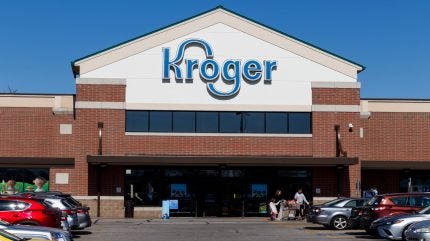
US grocery chain Kroger has booked a $100m impairment charge in anticipation of shutting down 60 stores by the end of 2026. The plan has been revealed in its first quarter (Q1) 2025 results.
The closures will yield a modest financial advantage for the company.

Discover B2B Marketing That Performs
Combine business intelligence and editorial excellence to reach engaged professionals across 36 leading media platforms.
The company committed to “reinvesting these savings back into the customer experience, and as a result, this will not impact full-year guidance. Kroger will offer roles in other stores to all associates currently employed at affected stores.”
Kroger posted total sales of $45.1bn in the first quarter (Q1) of 2025, a marginal decline from $45.3bn in the same period of the previous year, which included $917m from the sale of Kroger Specialty Pharmacy.
Excluding fuel, speciality pharmacy sales and adjustment items, sales were up by 3.7% year on year (YoY).
Operating profit for Q1 2025 was $1.32bn as against $1.29bn in Q1 2024. Earnings per share (EPS) were constant at $1.29 in Q1 2025 while adjusted EPS was $1.49 as against $1.43 in Q1 2025.

US Tariffs are shifting - will you react or anticipate?
Don’t let policy changes catch you off guard. Stay proactive with real-time data and expert analysis.
By GlobalDataKroger chairman and CEO Ron Rargent stated: “Kroger delivered solid first quarter results, with strong sales led by pharmacy, e-commerce and fresh. We made good progress in streamlining our priorities, enhancing customer focus, and running great stores to improve the shopping experience.”
Gross margin for the quarter stood at 23% of sales, an improvement from 22% last year, primarily due to the divestment of Kroger Specialty Pharmacy, reduced shrink and lower supply chain costs.
However, this was partially offset by the growth in pharmacy sales, which typically have lower margins.
The company faced a “last in, first out” (LIFO) charge of $40m, slightly less than the $41m charge from the same period of 2024.
Operating, general and administrative rate, without the inclusion of fuel, along with adjustment items, rose 63 basis points, driven by the sale of Kroger Specialty Pharmacy and increased contributions to a multi-employer pension plan, despite gains in productivity.
In terms of capital allocation, Kroger anticipates strong free cash flow and plans to continue its investment strategy for sustainable growth and to uphold its investment grade debt rating.
Kroger entered a $5bn accelerated share repurchase programme in the fourth quarter of fiscal 2024, which is part of a larger $7.5bn share repurchase authorisation and is expected to conclude by Q3 2025.
The company plans to resume open market share repurchases under the remaining $2.5bn authorisation to complete them by the end of fiscal 2025.
Kroger’s net total debt to adjusted EBITDA ratio was 1.69, up from 1.25 a year earlier, but well within the target range of 2.3 to 2.5.
The company’s balance sheet is described as strong and is expected to facilitate continued investments and shareholder value enhancement.
For the full year 2025, Kroger has updated its identical sales without fuel guidance to 2.25% to 3.25%.
It reaffirmed its adjusted FIFO operating profit of $4.7bn to $4.9bn, adjusted net earnings per share of $4.6 to $4.8, adjusted free cash flow of $2.8bn to $3bn, capital expenditures of $3.6bn to $3.8bn, and an adjusted effective tax rate of 23%.
Kroger chief financial officer David Kennerley stated: “Our strong sales results and positive momentum give us confidence to raise our identical sales without fuel guidance, to a new range of 2.25% to 3.25%.
“While first quarter sales and profitability exceeded our expectations, the macroeconomic environment remains uncertain and as a result other elements of our guidance remain unchanged. We continue to believe that our strategy focusing on fresh, Our Brands and e-commerce will continue to resonate with customers and our resilient model positions us well to navigate the current environment.”
In May 2025, Kroger announced that it is recruiting 15,000 new associates to enhance the shopping experience for its customers.





